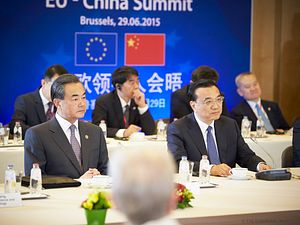In late 2015, a European official was talking with me about the many delegations they had received over the years from China. In the end, my conversation partner finally shrugged, looked wistfully ahead, and asked, partly rhetorically, “What do they (the Chinese) really think of us? We have the meetings, we say the right things, we seem to get on fine, but you never really get an idea of what they expect or want from Europe.”
The most striking insight this conversation gave me was that what the Europeans believe the Chinese think of them is just as much of a question as how the Chinese actually regard Europeans. Everyone is bewildered because they are second guessing.
Xi Jinping called Europe and China “civilizational partners” when he went to Brussels in early 2014. But almost two years on, the abstract nature of the phrase continues to be puzzling. For all its good intentions, Xi’s idea has not helped much in solving central problem for Europeans: what China really thinks of them. It sounds nice – but what does it actually mean? Surely China is civilizational partners with the United States, Australia, and any other sovereign state, not just the EU. These grand words end up not conveying much at all that relates specifically to the EU.
The epic huddle in Paris at the climate change talks this December does at least illustrate one way where China and the EU are absolutely aligned. In terms of technology and intellectual property transfer generally, the EU is far and away China’s best quality and largest partner. It is a relationship which, ironically, is not just about money, despite all the talk of the two representing the largest shared trading link in the world. Behind this trade is a genuine exchange of ideas with real practical impact. Taking the maglev train from Shanghai Pudong to the city center, you are using German technology. Chinese roads are full of cars with European brands, many of them produced in joint ventures in-country. Airbus, Siemens, GSK (all European companies) not only sell to China, but manufacture, research, develop, and innovate with Chinese partners.
It is odd that this very collaborative side of the relationship is not given a higher profile. That’s probably because, on the whole, it is not that exciting – just steady, consistent collaboration, hardly stuff for the front page. All this proves is that the real problem in China-EU relations is not in terms of practical engagement. It is more about forging political unity within the EU itself over the issue of what China means to Europe. Anyone who deals with Chinese matters in the corridors of Brussels would find it hard to avoid early onset of a sense of mismatch and dislocation. The EU institutionally, and its member states, are stuffed with expertise, initiatives, and people-to-people contacts; rich links that extend in almost every area. There can be few more populated and busy relationships. And yet, at the topmost level, there seems to be an empty space. There is no single powerful EU voice on China.
This is especially striking because the normal places where you would expect to hear this sort of vision articulated – the president, high representative for foreign affairs, and the various other EU commissionaires – in the EU at least, simply don’t do this sort of big picture thing, at least regarding China. Traditionally, if it has been done by anyone, it has usually been by specific leaders of the member states. In the past German chancellors or French presidents who had an interest did try to do more ambitious, EU-wide work with China, and speak more as European rather than national leaders when in China. But in recent years, this has been neglected. At present, we simply don’t see that high profile, politically powerful single voice taking the initiative and risk of talking about China ambitiously within the EU and creating at least some semblance of unity. It means, therefore, that the EU-China relationship is perennially less than the sum of its parts at the topmost political level.
There is an intriguing scenario that might play out in the next few months and years. Much to the surprise of almost everyone, the country with the most prominent relationship with China now is the U.K. In the last twelve months, from unilaterally joining the Asian Infrastructure Investment Bank, to hosting a state visit remarkable for the protocol and flattery given to the Chinese leader in October, the U.K. has stunned its EU colleagues with the risks it has been taking in this area.
If the U.K. tactic works (and it is a huge “if” at the moment), and Chinese good quality investment, cooperation, and market access back in China start to appear, then other EU countries might start to think London is on to something, and indulge in the highest form of flattery – emulation. It might even mean the final irony of the U.K., the great European outlier and skeptic, having a greater leadership role in the currently empty space of China-EU elite interaction and political focus (all of this, of course, being dependent on the U.K. opting to stay in the EU when it holds its referendum on membership in the next year or so).
Stranger things have happened. The choice at the moment is a simple one. Either carry on with a huge, but meandering and often undirected relationship and deal with perennial frustration on both sides – or grasp the nettle and try to aim for something more unified. If the status quo is maintained, then, to go back to the question we started from, it will be easy enough to work out one thing the Chinese definitely think about Europe: that it is a great idea, but blighted by its disunity. The most dominant Chinese attitude toward Europe might just be confusion.

































